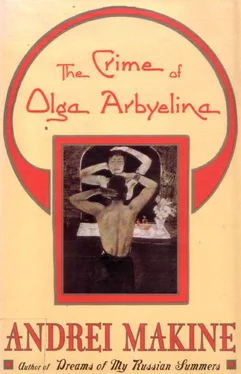In front of the mirror in the hall she quickly straightened her dress, tidied her hair, and seemed to recover the use of her features. Nevertheless, as she opened the door she was expecting, in spite of herself, to see a whole cluster of faces animated by malevolent and mocking curiosity.
The door opened on the luminous void of the sky. There was nobody on the steps; the meadow that sloped down to the river sparkled with drops of melted frost, and was also deserted. The sunny freshness of the air cleansed the lungs, penetrated the body. If only it could be possible! To have this morning as it was, but free of all the rest: the voices in her head contradicting one another from one moment to the next; other people's stares emptying her out of herself; numberless fears, above all, those of the previous evening…
Her hope did not last longer than the deep breath she took, inhaling the scent of the frozen grass… Then her gaze slipped along the wall and she saw a woman leaning on the windowsill, trying to look inside. Fear returned to her so abruptly that it gave rise to an improbable idea: "But that's me! Yesterday…" In a veritable flash of madness, Olga saw the woman leaning toward the window as herself. But at once another thought, less fantastic and still more distressing, banished the resemblance: "She's spying on me!"
The woman began tapping on the window with a bent forefinger, shading her eyes with the other hand to avoid the reflection…
Olga called to her. The woman straightened up: it was the nurse from the retirement home. "Something's happened to the child." This panic, like a squall of wind, raised a maelstrom of further anxious reflexes: "If something's happened to him it's my fault, it's because of that moment of bliss there on the steps…" They were not even thoughts but a sequence of images-the flow of blood that would have to be stanched on the child's body; and the blame she would have to take upon herself in order to pacify fate.
The nurse came up to her and greeted her mournfully and coldly. "No, it's something else, otherwise she would have spoken straight away," thought Olga. She had seen these bringers of bad tidings arriving so many times…
At that moment she sensed an inquisitive stare on the part of the nurse. The latter must have noticed the residue of sleep on her face, the traces of earth on her hands. Olga clenched her fists, hid them behind her back, and with a nod invited the nurse to come in. In the corridor her anxiety increased. The nurse stopped, her hand resting on the chest of drawers, precisely at the spot where the dangerous corner had been sawed off. "She has guessed something," Olga thought again, and shook herself immediately: "Idiot! What is there to guess in this hovel?"
"I hope you'll have a cup of tea with me?"
Olga s voice sounded like a line from a role too well learned.
In the kitchen she saw the little copper saucepan and on the table the orange crayon. The nurse followed her look. She felt the visitor had not taken her eyes off her once and experienced an improper desire to call her to order: "All this is none of your business!"
"No tea, thank you, I don't have time. I've come to tell you… to tell you that last night… Xenia Yefimovna…"
Xenia, the elderly boarder who for years had been promising Olga to show her the famous "white flowers" that nobody knew about, had just died… And now someone must go to Paris, the nurse said, to see her son and her daughter-in-law and let them know. In her role as the Princess Arbyelina, Olga had already carried out such delicate missions on several occasions.
"I know it's Sunday today," apologized the young woman. "It will spoil your whole day. I know… But no one but you could find the right words…"
Listening to her, Olga tasted the delicious simplicity of life. The wholesome, robust common sense of life, in which death, too, has its place.
In the train it was the memory of the white flowers beneath the trees in a fantasy woodland that saved her from the thought that suddenly assailed her: "Supposing I had waked up of my own accord this morning after that abnormally long sleep."
She understood that with all her strength she must hang on to the clear, dull appearances of life.
In Paris she carried out her mission with a kind of fervor. On this occasion the solemn murmuring of condolences, the son's contrite expression, his wife's sighs had the value of a proof. Yes, the interlude they were all three of them applying themselves to acting out demonstrated that in other people's eyes she remained uniquely the "Princess Arbyelina." And that no one had any inkling of the existence within her of the woman who, only the previous evening, rooted to the spot under the window of her own house, had been observing the actions of an adolescent boy…
Another proof was the street. Olga walked through the crowd scrutinizing the expressions on people's faces, like someone on her first outing after an operation, trying to guess from the looks of the passersby if the aftereffects are visible or not.
She also called on Li. That Sunday her friend was painting. The features of a pair of characters were already emerging on a plywood panel: a woman in a white dress, with bare shoulders, and a man slightly shorter than she, with curly hair framing the round hole for his face…
"By the way, I meant to ask you." Olga s voice was tinged with careful nonchalance. "That infusion I recommended to you, does it have any effect on your insomnia?"
"Oh yes! It certainly does…"
Li replied in the same absentminded tone without lifting her brush from the surface of the painting…
During the return journey, it seemed to Olga as if all the passengers had their newspapers open at the same page. She glanced at the one her neighbor was reading. It was the same twelve portraits that fascinated them all. Nuremberg tribunal: the verdict ran the headline above the photos. The condemned men had their eyes shut: their portraits were there as evidence of their deaths. At the bottom of the page an American soldier could be seen demonstrating the noose that was used in the executions. The thickness of the rope, very white, even beautiful, seemed out of proportion. It looked like the rigging of a ship or a long roll of dough for some gigantic pretzel… Olga's neighbor got off the train, leaving his newspaper on the seat. She glanced at the article. Two columns of figures in a box indicated the precise time at which the hanging of each of the condemned men had started and the time death had occurred. "In other words, the amount of time they were struggling in that pretzel," thought Olga.
The numbers reminded her of the boring, enigmatic figures showing stock market prices.
Trap Opened At: Pronounced Dead At:
Ribbentrop 1:14 p.m. 1:32 p.m.
Keitel 1:20 p.m. 1:34 p.m.
Rosenberg 1:49 p.m. 1:59 p.m.
She looked up. The passengers were discussing the story as they read it, calling out comments to one another from one seat to the next, pointing their fingers at this or that part of the report. "No, not the stock market prices," Olga said to herself, watching this animation. "More like the results of a game." On her right a man reminiscent of a poorly acted father in a character comedy was leaning toward the person across from him, undoubtedly his wife, and reading the report of the trial aloud to her. For her part the woman seemed visibly embarrassed by her husband's overexcited declamation. She sat very upright, her handbag on her knees, looking down onto the bowed head of the man as he read, raising her eyebrows from time to time, sighing and lifting her eyes heavenward. Her husband failed to notice these condescending little grimaces, and kept wagging his finger to lend emphasis to his reading:
"'They all died with dignity'-Dignity! Who are they kidding?-'apart from Streicher, who shouted abuse at those present… Only Hermann Goering succeeded in escaping the shame of the gallows… Emmy Sonnemann, Frau Goering, kissed her husband through the mesh of the grill and transferred the vial of potassium cyanide from her mouth to his…' Look, there's a picture of the vial…"
Читать дальше












